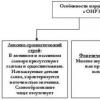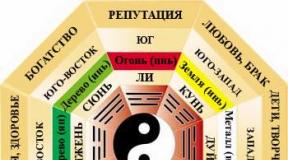The meaning of symbolic dreams of hrynev. An essay on the theme of Grinev's Dream in Pushkin's story "The Captain's Daughter Analysis of Grinev's Dream
Peter Grinev. Rare amateur drawing from a private site
Grinev's prophetic dream was inspired by a blizzard ("... I dozed off, lulled by the singing of the storm and the rolling of a quiet ride ..."), the dream seems to continue the description of the storm. Grinev's dream is endowed with the function of predicting subsequent events. But this "prediction" is needed for very specific purposes: Pushkin it is necessary to force the reader to return to the dream scene when meeting familiar facts, as it were. It is important to remember at the same time that the dream I saw is prophetic: Grinev himself warns the reader about this: "I had a dream that I could never forget and in which I still see something prophetic when I reflect on the strange circumstances of my life" ... Grinev remembered his old dream all his life. And the reader had to remember him all the time the same way as Grinev, "to understand" with him everything that happened to the memoirist during the Pugachev uprising.
Grinev and Masha Mironova
This perception of the symbolic meaning is due to the centuries-old folk tradition. The researcher of dreams in popular beliefs rightly wrote: "Since ancient times, the human mind has seen in dreams one of the most effective means to lift the mysterious veil of the future." Prophetic dreams are never forgotten by a person until they come true. Pushkin knew these beliefs. That is why Grinev did not forget his prophetic dream. The reader should not have forgotten it either.

Grinev in front of Emelyan Pugachev
What kind of dream did Grinev have? He dreamed that he had returned home:
“Mother meets me on the porch with an air of deep grief. “Hush,” she says to me, “my father is sick near death and wants to say goodbye to you.” - Struck by fear, I follow her into the bedroom. I see the room is dimly lit; people with sad faces are standing by the bed. I walk quietly to the bed; Mother lifts the canopy and says: “Andrei Petrovich, Petrusha has arrived; he came back, having learned about your illness; bless himʺ. I knelt down and fixed my eyes on the sick man. Well? .. Instead of my father, I see a man with a black beard lying in bed, looking at me cheerfully. In bewilderment, I turned to my mother, saying to her: “What does this mean? This is not a father. And why should I ask the peasant's blessing? ʺ - It's all the same, Petrushka, - my mother answered me, - this is your planted father; kiss his hand, and may he bless youʺ ... "

Grinev's duel with Shvabrin
Let's pay attention to the underlined reality of dream events and characters - everything is everyday, there is nothing symbolic in the described picture. It is rather absurd and fantastic, as often happens in dreams: a man is lying in his father's bed, from whom you have to ask for blessings and "kiss the hand" ... The symbolic in it will manifest itself as the reader gets acquainted with the plot development of the novel - then a guess will be born that a man with a black beard is similar to Pugachev, that Pugachev was just as affectionate with Grinev, that he arranged his happiness with Masha Mironova ... The more the reader learned about the uprising and Pugachev, the more rapidly the versatility of the image of the peasant from the dream grew, his symbolic nature.

Grinev's dream is studied at school
This becomes especially evident in the final dream scene. Grinev does not want to fulfill his mother's request - to come under the peasant's blessing. “I didn’t agree. Then the man jumped out of bed, grabbed the ax from behind his back and began waving in all directions. I wanted to run ... and could not; the room was filled with dead bodies; I stumbled over bodies and slid in bloody puddles ... A terrible man affectionately called me, saying: “Don't be afraid, come here! under my blessing ... ""

A man with an ax, dead bodies in the room and bloody puddles - all this is already openly symbolic.
The ax is in the hands of the villain ... Was Grinev dreaming of the ax that Raskolnikov later took into his hands?
Peter Grinev. Rare amateur drawing from a private site
Grinev's prophetic dream was inspired by a blizzard ("... I dozed off, lulled by the singing of the storm and the rolling of a quiet ride ..."), the dream seems to continue the description of the storm. Grinev's dream is endowed with the function of predicting subsequent events. But this "prediction" is needed for very specific purposes: Pushkin it is necessary to force the reader to return to the dream scene when meeting familiar facts, as it were. It is important to remember at the same time that the dream I saw is prophetic: Grinev himself warns the reader about this: "I had a dream that I could never forget and in which I still see something prophetic when I reflect on the strange circumstances of my life" ... Grinev remembered his old dream all his life. And the reader had to remember him all the time the same way as Grinev, "to understand" with him everything that happened to the memoirist during the Pugachev uprising.

Grinev and Masha Mironova
This perception of the symbolic meaning is due to the centuries-old folk tradition. The researcher of dreams in popular beliefs rightly wrote: "Since ancient times, the human mind has seen in dreams one of the most effective means to lift the mysterious veil of the future." Prophetic dreams are never forgotten by a person until they come true. Pushkin knew these beliefs. That is why Grinev did not forget his prophetic dream. The reader should not have forgotten it either.

Grinev in front of Emelyan Pugachev
What kind of dream did Grinev have? He dreamed that he had returned home:
“Mother meets me on the porch with an air of deep grief. “Hush,” she says to me, “my father is sick near death and wants to say goodbye to you.” - Struck by fear, I follow her into the bedroom. I see the room is dimly lit; people with sad faces are standing by the bed. I walk quietly to the bed; Mother lifts the canopy and says: “Andrei Petrovich, Petrusha has arrived; he came back, having learned about your illness; bless himʺ. I knelt down and fixed my eyes on the sick man. Well? .. Instead of my father, I see a man with a black beard lying in bed, looking at me cheerfully. In bewilderment, I turned to my mother, saying to her: “What does this mean? This is not a father. And why should I ask the peasant's blessing? ʺ - It's all the same, Petrushka, - my mother answered me, - this is your planted father; kiss his hand, and may he bless youʺ ... "

Grinev's duel with Shvabrin
Let's pay attention to the underlined reality of dream events and characters - everything is everyday, there is nothing symbolic in the described picture. It is rather absurd and fantastic, as often happens in dreams: a man is lying in his father's bed, from whom you have to ask for blessings and "kiss the hand" ... The symbolic in it will manifest itself as the reader gets acquainted with the plot development of the novel - then a guess will be born that a man with a black beard is similar to Pugachev, that Pugachev was just as affectionate with Grinev, that he arranged his happiness with Masha Mironova ... The more the reader learned about the uprising and Pugachev, the more rapidly the versatility of the image of the peasant from the dream grew, his symbolic nature.

This becomes especially evident in the final dream scene. Grinev does not want to fulfill his mother's request - to come under the peasant's blessing. “I didn’t agree. Then the man jumped out of bed, grabbed the ax from behind his back and began waving in all directions. I wanted to run ... and could not; the room was filled with dead bodies; I stumbled over bodies and slid in bloody puddles ... A terrible man affectionately called me, saying: “Don't be afraid, come here! under my blessing ... ""

A man with an ax, dead bodies in the room and bloody puddles - all this is already openly symbolic.
The ax is in the hands of the villain ... Was Grinev dreaming of the ax that Raskolnikov later took into his hands?
Think about it at the right moment
An alternative to the 2-year Higher Literary Courses and the Gorky Literary Institute in Moscow, where they study for 5 years full-time or 6 years in absentia, is the Likhachev School of Writing. In our school, the basics of writing are purposefully and practically taught in only 6-9 months, and even less if the student wishes. Come on in: Spend just a little money and get up-to-date writing skills and get sensible discounts on editing your manuscripts.
The instructors at the Likhachev Private School of Writing Skills will help you avoid self-harm. The school works around the clock, seven days a week.
A very special role in the novel is played by Grinev's dream, which he sees immediately after the first meeting with the counselor-Pugachev. The lack of study of the realism of Pushkin in the 1830s leads to the fact that the symbolic principle is ignored in him, is not taken into account when analyzing works, in particular "The Captain's Daughter". The introduction of Grinev's dream is explained as pre-event information: Pushkin warns the reader what will happen to Grinev next, how his relationship with Pugachev will develop. Such an interpretation contradicts the very principle of Pushkin's narration - with its brevity and laconicism, a dynamically developing plot. And why, one wonders, repeat the same thing twice: first in a dream, and then in real life? True, sleep is to a certain extent endowed with the function of predicting subsequent events. But this "prediction" is needed for completely special purposes: Pushkin needs to force the reader to return to the dream scene when meeting, as it were, familiar facts. This special role of returns will be discussed later. Vaya? -But remember at the same time that the dream I saw is prophetic: Grinev himself warns the reader about this: “I had a dream that I could never forget and in which I still see something prophetic when I understand strange circumstances with it of my life". Grinev remembered his old dream all his life. And the reader had to remember him all the time, just like Grinev, to "understand" with him everything that happened to the memoirist during the uprising. This perception of the symbolic meaning is due to the centuries-old folk tradition. The researcher of dreams in popular beliefs rightly wrote: "Since ancient times, the human mind has seen in dreams one of the most effective means to lift the mysterious veil of the future." Prophetic, prophetic dreams, writes the same researcher, relying on the richest material of observations, “are never forgotten by man until they come true.” Pushkip knew these beliefs. That is why Grinev never forgot his prophetic dream. reader. What dream did Grinev have? He dreamed that he returned home: "... Mother meets me on the porch with an air of deep grief." Hush, "she says to me," Father is sick near death and wants to say goodbye to you. " "Struck by fear, I follow her into the bedroom. I see the room is dimly lit; people with sad faces are standing by the bed. I quietly walk up to the bed; mother lifts the canopy and says:" Andrei Petrovich, Petrusha has arrived; he came back, having learned about your disease; bless him. " I knelt down and fixed my eyes on the man. Well? .. Instead of my father, I see a man with a black beard lying in bed, looking at me merrily. In bewilderment, I turned to my mother, telling her: “What does this mean? This is not a father. And why should you ask a peasant's blessing? " “All the same, Petrushka,” my mother answered me, “this is your planted father; kiss his hand, and may he bless you "..." Let's pay attention to the emphasized reality of the events of the dream and the characters - everything is everyday, there is nothing symbolic in the picture described. It is rather absurd and fantastic, as often happens in dreams: a man is lying in his father's bed, from whom you have to ask for blessings and "kiss the hand" ... The symbolic in it will groan as the reader gets acquainted with the plot development of the novel - then a guess will be born that a man with a black beard resembles Pugachev, that Pugachev was just as affectionate with Grinev, that he arranged happiness with Masha Mironova ... The more the reader learned about the uprising and Pugachev, the more rapidly the multifaceted image of a peasant from a dream its symbolic nature came out more clearly. This becomes especially evident in the final scene of the dream. Grinev does not want to fulfill his mother's request - to come under the peasant's blessing. “I didn’t agree. Then the man jumped out of bed, grabbed the ax from behind his back and began waving in all directions. I wanted to run ... and could not; the room was filled with dead bodies; I stumbled over the body and slipped in the bloody puddles ... The terrible man called me affectionately, saying: “Don't be afraid, come over! under my blessing ... "" A man with an ax, dead bodies in the room and bloody puddles - all this is already openly symbolic. But symbolic ambiguity manifests itself from our knowledge about the victims of the Pugachev uprising, about many dead bodies and pools of blood that Grinev saw later - no longer in a dream, but in reality.
The prophetic dream of Peter Grinev and its meaning in the story of A.S. Pushkin " Captain's daughter»
What is this interpretation? what is it about? Explain! contradicts the very principle of Pushkin's narration - with its brevity and laconicism, dynamically developing plot. And why, one wonders, repeat the same thing twice: first in a dream, and then in real life? True, sleep is to a certain extent endowed with the function of predicting subsequent events. But this "prediction" is needed for completely special purposes: Pushkin needs to force the reader to return to the dream scene when meeting, as it were, familiar facts. This special role of returns will be discussed later. remember at the same time that the dream I saw is prophetic: Grinev himself warns the reader about this: "I had a dream that I could never forget and in which I still see something prophetic when I reflect on the strange circumstances of my life with it" ... Grinev remembered his old dream all his life. And the reader had to remember him all the time, just like Grinev, to "understand" with him everything that happened to the memoirist during the uprising. Edit the piece to clarify the point.
This perception of the symbolic meaning is due to the centuries-old folk tradition. The researcher of dreams in popular beliefs rightly wrote: "Since ancient times, the human mind has seen in dreams one of the most effective means to lift the mysterious veil of the future." Prophetic, prophetic dreams, writes the same researcher, relying on the richest material of observations, "are never forgotten by a person until they come true." Pushkin knew these beliefs. That is why Grinev did not forget his prophetic dream. The reader should not have forgotten it either.
Grinev's dream
What kind of dream did Grinev have? He dreamed that he had returned home: “... Mother meets me on the porch with an air of deep grief. "Hush," she says me - father sick near death and wants to say goodbye to you. " - Struck by fear, I follow her into the bedroom. I see the room is dimly lit; people with sad faces are standing by the bed. I walk quietly to the bed; Mother lifts the canopy and says: “Andrey Petrovich, Petrusha has arrived; he came back, having learned about your illness; bless him. " I knelt down and fixed my eyes on the sick man. Well? .. Instead of my father, I see a man with a black beard lying in bed, looking at me merrily. In bewilderment, I turned to my mother, telling her: “What does this mean? This is not a father. And why should I ask a peasant's blessing? " “All the same, Petrushka,” my mother answered me, “this is your planted father; kiss his hand, and may he bless you "..."
Let's pay attention to the emphasized reality of the events of the dream and the characters - everything is everyday, there is nothing symbolic in the described picture.
She is rather absurd and fantastic, as often happens in dreams: in his father's bed there is a man who must be asked for blessings and "kiss the hand" ... The symbolic in her will groan as the reader gets acquainted with the plot development of the novel - then a guess will be born, that a man with a black beard resembles Pugachev, that Pugachev was just as affectionate with Grinev, that it was he who arranged his happiness with Masha Mironova ... The more the reader learned about the uprising and Pugachev, the more rapidly the versatility of the image of the peasant from the dream grew; symbolic nature.
This becomes especially evident in the final dream scene. Grinev does not want to fulfill his mother's request - to come under the peasant's blessing. “I didn't agree. Then the man jumped out of bed, grabbed the ax from behind his back and began waving in all directions. I wanted to run ... and could not; the room was filled with dead bodies; I stumbled over bodies and slipped in bloody puddles ... A terrible man affectionately called me, saying: “Don't be afraid, come here! under my blessing ... ""
A man with an ax, dead bodies in the room and bloody puddles - all this is already openly symbolic. But symbolic ambiguity manifests itself from our knowledge about the victims of the Pugachev uprising, about many dead bodies and pools of blood that Grinev saw later - no longer in a dream, but in reality.
Grinev is also a young man who is looking for his own path in life.
Grinev's dream is a prediction of what this thorny path will be like.
The hero is taken out of his emotional balance by the circumstances of life. Grinev plunges into "gentle visions of half asleep."
Grinev, cut off from papa and mamma, of course, sees his own estate in a dream. But everything else ... Instead of a father - a bearded counselor. The ax is in his hands. Bloody puddles. Petrusha sees upcoming events and his role in them. He will witness a bloody battle, he will try to resist him. He will become akin to the instigator of the riot - this terrible bearded counselor who will become his planted father. If a dream is a sign, then Grinev's dream is a sign of fate.
Thus, Grinev's dream in Pushkin sets a tragic tone for the further narrative. A very special role in the novel is played by this dream, which the hero sees immediately after the first meeting with the counselor-Pugachev.
The lack of study of the realism of Pushkin in the 1830s leads to the fact that the symbolic principle is ignored in him, is not taken into account when analyzing works, in particular "The Captain's Daughter". The introduction of Grinev's dream is explained as information anticipating the events: Pushkin warns the reader what will happen to Grinev next, how his relationship with Pugachev will develop.
The meaning of Grinev's symbolic dreams in "The Captain's Daughter" by Alexander Pushkin and Raskolnikov - in "Crime and Punishment" by FM Dostoevsky
Like an ocean, the globe of the earth is voluminous,
Earthly life is surrounded by dreams ...
And the abyss is bared to us
With your fears and haze ...
F. I. Tyutchev
There is a time in our life when we do not belong to ourselves, when we are played by mysterious and incomprehensible forces generated by Cosmos and Chaos. This time is the time of sleep, when the soul breaks away from the body and lives its own independent life. The dream of a literary hero is part of the story of his soul.
Together with Pushkin's Tatyana, we run in her dream through a mysterious forest to a strange hut, where "a half-crane and a half-cat". And we will recognize her Russian soul, filled with fairy tales and legends of the "common people of antiquity". Together with Katerina Ostrovsky we fly away from the "dark kingdom" of Kabanikha and the Wild into the light world of dreams. Together with Oblomov, we find ourselves in the stagnant paradise of the sleeping Oblomovka. Together with Vera Pavlovna, we see in her dreams the embodiment of the cherished dreams of the great utopian N.G. Chernyshevsky.
What abysses do the dreams of Grinev and Raskolnikov reveal to us? Why are these heroes side by side in the wording of the topic? I'll try to answer. They are both young, both looking for their own ways in life. Grinev's dream is a prediction of what this thorny path will be; Raskolnikov's dreams are remorse for going down a crooked path. Both heroes are taken out of mental equilibrium by the circumstances of life. Grinev plunges into "gentle visions of half asleep," Raskolnikov is in a semi-conscious state, close to delirium. And at such moments, dreams are convex, clear, expressive. Grinev, cut off from papa and mamma, of course, sees in a dream his native estate. But everything else ... Instead of a father - a bearded counselor. The ax is in his hands. Bloody puddles. Petrusha sees upcoming events and his role in them. He will witness a bloody battle, he will try to resist him. He will become akin to the instigator of the riot - this terrible bearded counselor who will become his planted father. If a dream is a sign, then Grinev's dream is a sign of fate.
For Rodion Raskolnikov, his first dream could become such a sign of warning. Fearing the very word murder, "he kept asking himself:" ... is it really possible? "He doubted whether a living being was ready to commit the worst of violence. To Rodion: “Thou shalt not kill!” Waking up, Raskolnikov asks himself: will he really take an ax and start hitting him on the head? But, alas, this dream did not prove to Dostoevsky's hero that murder is contrary to human nature.
And then I remembered V. Mayakovsky's "good attitude to horses". The same crowd laughing at the fallen horse, the same tears of a living creature ... And a peculiar vision of the poet of humanism: ... we are all a little bit of a horse, Each of us is a horse in his own way. But Raskolnikov finds another word for the old woman-pawnbroker - "louse", of the lice is the most useless. And he has a dream that he beats and beats an old woman with an ax on the head, and she laughs and laughs. Even before sleep, Rodion would be ready to kill her another time if she woke up. Why does he think about her so much? The real hero of his theory ("prophet", Napoleon) does not think about any old women. He would put a battery across the street and “blow at the right and the guilty” without feeling any remorse. And since Rodion is dreaming of an old woman-pawnbroker, it means that he has remorse; means, "weakling", "trembling creature". This is what Rodion cannot forgive the old woman. If these dreams reflected the struggle taking place in the soul of the hero, then in Raskolnikov's last dream we hear Dostoevsky himself, polemicizing with those who rely on the transforming power of ideas in search of the harmony of the world. Rodion dreamed of these ideas in the form of trichines, microscopic creatures endowed with intelligence and will. They nestled in the brains of people. The most terrible thing for Dostoevsky was that those infected with these trichines considered themselves the most intelligent and unshakable in their righteousness.
The writer did not accept that the truth could be born from the head, and not from the heart. And therefore, people infected with trichinas did not know what is good, what is evil, and killed each other in a senseless rage in the name of the triumph of truth. This dream of Raskolnikov opens before us the cherished dream of FM Dostoevsky that the world will not be saved by a brilliant idea, but by the moral re-education of mankind. Why are there so many painful dreams in FM Dostoevsky's novel?
Grinev's dream in Pushkin sets a tragic tone for the further narrative. With the dreams of his hero, Dostoevsky not only aggravates the general gloomy background of the narrative, but also argues, argues, argues. Why is it so? I think the answer is that "The Captain's Daughter" is the author's story about a historical tragedy that happened, and "Crime and Punishment" is a warning about a historical tragedy that may be.
Bibliography
For the preparation of this work were used materials from the site lib.



















